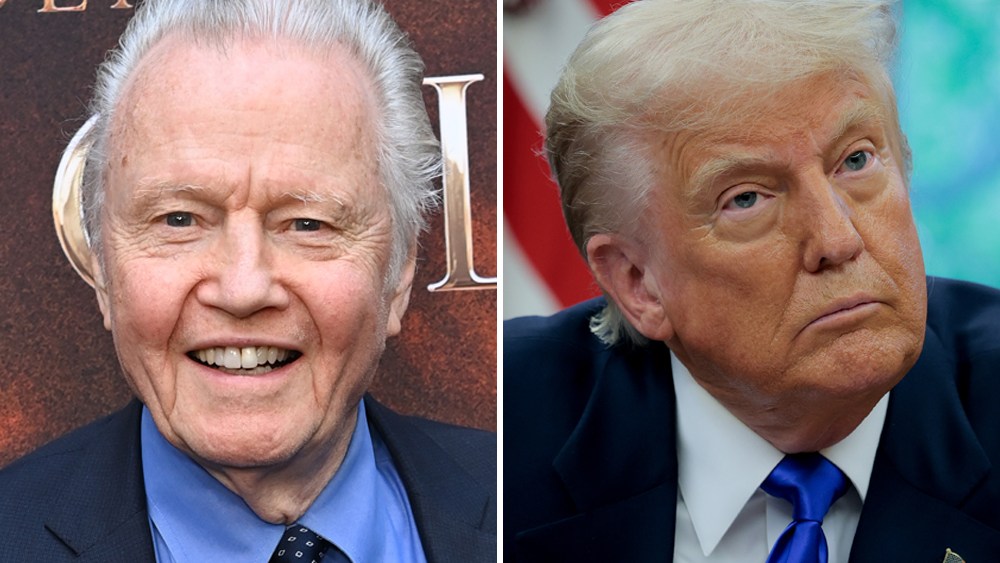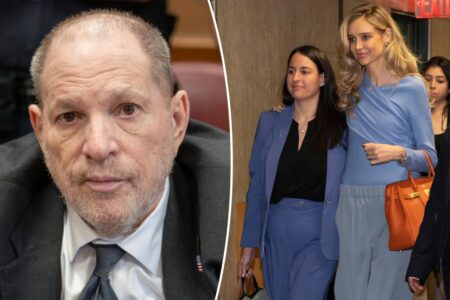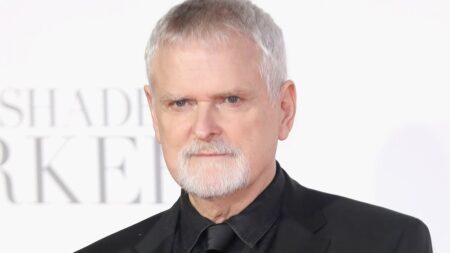Several decades ago, Jon Voight first met Donald Trump at an Oscars afterparty. The Academy Award-winning best actor can’t remember the exact year, but he thinks it was not long after the debut of Franco Zeffirelli 1979 sports classic “The Champ.” The two men bonded over the film and Voight’s iconic performance as a former boxer looking for personal redemption by returning to the ring.
“He loves that movie,” Voight says of the president. “He also loves ‘Rocky,’ and there’s a little bit of a playfulness about which one is the better film.”
Now, Voight is working with President Trump — a politician he has fervently backed since 2016 — on a plan to stem runaway production and “give people back their dignity and their jobs,” He adds, “Something has to be done, and it’s way past time.”
For a town accustomed to bombshells, President Trump’s post on Sunday that called for 100% tariffs “on any and all Movies coming into our Country that are produced in Foreign Lands” sent shockwaves through Hollywood and beyond. Though an overwhelming majority of the industry would concur that some type of federal help is needed, the confusing post was met with skepticism and negative headlines.
Variety caught up with Voight by phone while he was driving through what sounded like a car wash. He declined to talk about specifics or logistics, preferring to allow the draft presentation he spearheaded with producer Steven Paul to speak for itself. But the “Coming Home” legend did weigh in on the impetus behind taking the plan to the president, who Voight describes as a movie buff and pop culture enthusiast, and his surprise at the media’s negative reaction — “How about enthusiasm and gratitude?” He insists that the headlines about the tariff plan do not reflect what he is hearing from a broad spectrum of interests.
“We’ve gotten a lot of good response from people,” he says. “We’re really rolling up our sleeves and working. I think we have a good plan, and we’re just beginning. This little team of mine has worked very hard to try to figure out things. The union people and producers give their expertise and understanding to this problem, and we’re working together. A lot of people had a lot of input and we’re listening to everybody.”
How Hollywood got to this point, where the U.S. film and TV economy began to freefall as studios opted to shoot in Canada, the U.K., Hungary and Australia over Los Angeles and domestic hubs like Atlanta and New York, was inevitable, Voight says. As a result, the rank and file like makeup artists, costume designers and camera people have been hit the hardest with too few jobs available at any given time. Instead, the studios mostly hire local crews when shooting abroad.
“Every studio has a lot of smart people, and they have maneuvered the write-offs and the gifts that are being given out throughout the world to lure people to different countries. They take advantage of them,” Voight says of the incentives that can shave tens of millions of dollars off of a film’s budget. “Now we’re saying, ‘Hey, we have to have that here.’ Let’s have the level playing field. But really, we need more than that. We need to be competitive.”
What may come as a surprise is President Trump’s interest in intervening on behalf of an industry that almost universally loathes him.
“I think he’s been treated unfairly. I think I have too. But what’s the difference? Who cares?” Voight asks. “I mean, there’s been a battle, but now it’s time to put that aside. And I must say, in all of the interactions we’ve had [on addressing runaway production], politics has never come up. Never.”
Voight believes that Hollywood Democrats are eager to put aside the charged 2024 election that saw Trump prevail over Democrat Kamala Harris. As he sees it, Hollywood is facing the most pronounced existential crisis in its history.
“It’s come to a point where we really do need help, and thank God the president cares about Hollywood and movies,” he says. “He has a great love for Hollywood in that way. We’ve got to roll up our sleeves here. We can’t let it go down the drain like Detroit.”
Scott Karol, the lawyer who worked closest with Voight and Paul on the plan, is a Democrat. It’s likely most of the people he has sought input from are left-leaning as well.
“This shouldn’t be political. I don’t know the political identities of the people we’ve talked to. We’ve talked to a lot of people here. I don’t distinguish them on their party affiliation. And If we can come up with [a plan that can be executed], he’ll back us. He wants us to be the Hollywood of old,” Voight adds. “If we all come together, I believe we have a bright future.”
Read the full article here








